Lighten Up Coaches, People Should Be Allowed To Train Wherever They Want
Lighten Up Coaches, People Should Be Allowed To Train Wherever They Want
It has been historically frowned upon in jiu-jitsu culture to train with a team that's not your own. In many cases, it was flat-out forbidden.
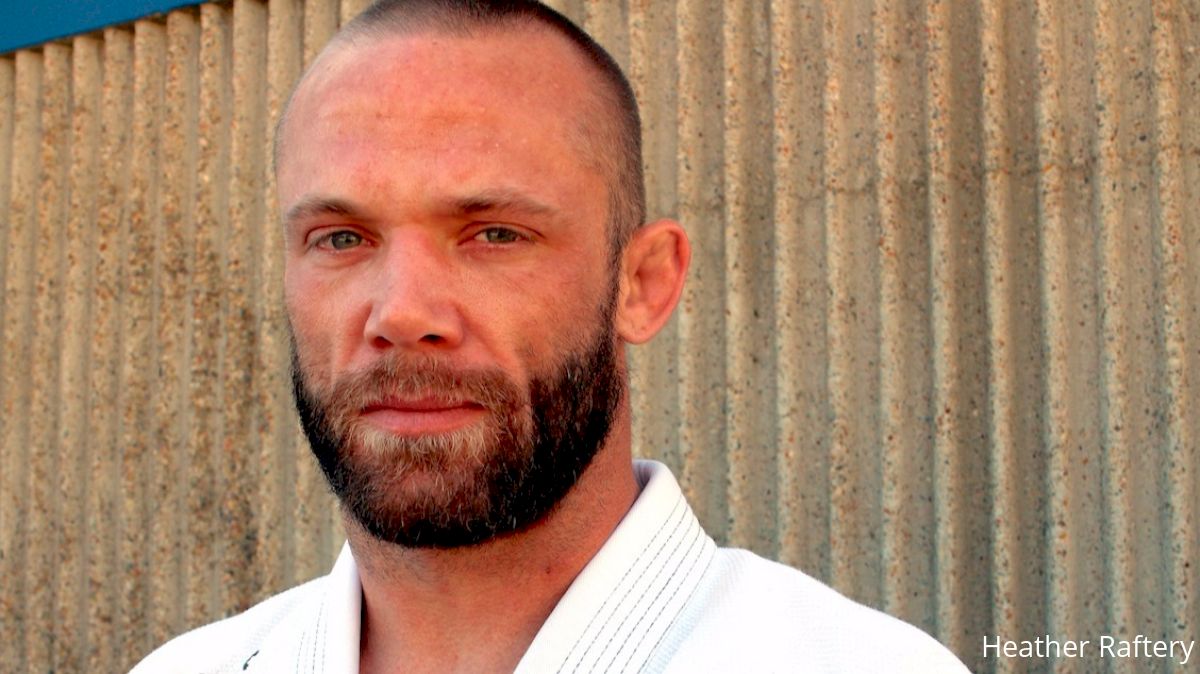
It has been historically frowned upon in jiu-jitsu culture to train with a team that's not your own. In many cases, it was flat-out forbidden.
If a student was to train at another team without explicit permission from his or her instructor, then that student would be met with harsh criticism, exclusion, and sometimes even expulsion from his or her team.
The mentality of exclusively training in one gym was more common in the earlier years of jiu-jitsu expansion, especially the 1990s and early 2000s. As jiu-jitsu continues to grow around the world it is becoming more common to see practitioners embracing the mindset of "jiu-jitsu vs. the world" -- or that of the "extended jiu-jitsu family," which is to accept all jiu-jitsu practitioners as your brethren.
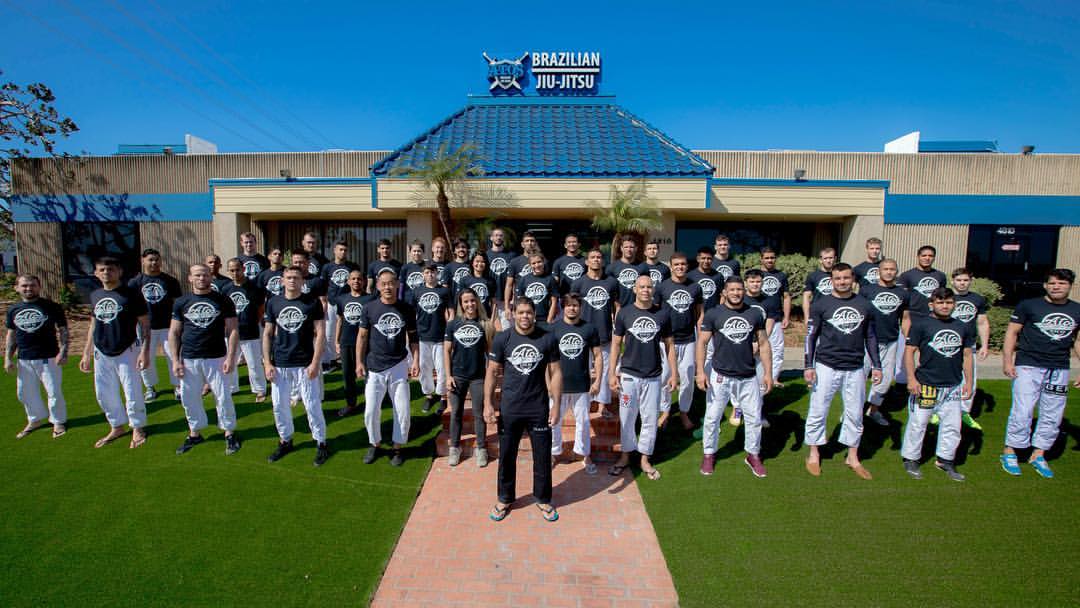
The Atos team in San Diego, as led by Andre Galvao.
It is apparent, based on recent social media activity, that the jury is still out on whether training at different teams is considered acceptable behavior or not. Of course, every situation is unique and no single rule can fairly cover all potential situations that will arise.
Here, I will unpack and dissect some of the more nuanced situations about cross-team training. There is still some debate about the treatment of part-time hobbyist practitioners versus full-timers, what to do during high-profile training camps, training while traveling, and managing friendships and relationships between members of different teams.
Also, for the sake of debate, it is important to understand why team leaders may not want their students and athletes training with other teams.
It is my strong opinion that these types of students can train wherever they want, whenever they want. They are not bound by the "loyalty" argument. Customer loyalty is generally built when they are satisfied with the service for which they are paying. They pay their dues for the services of the instructor, and that's that. I don't believe the instructor has any right to ask (or demand) that the student does not train anywhere else.
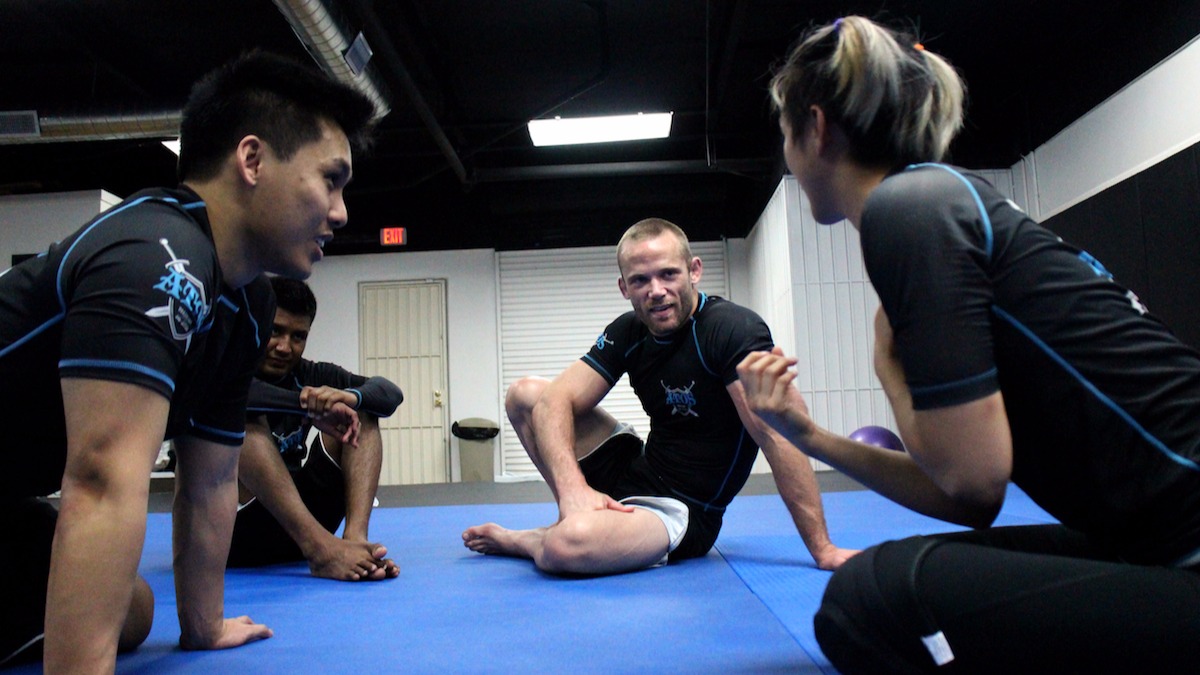
Josh working with some of his students at Atos. Photo: Heather Raftery
Now if the instructor, or academy owner, is allowing a student to train at their academy for free, I can certainly understand why they might become frustrated with the idea of their scholarship student training with other teams. But still, I believe that the instructor doesn't not have a legitimate claim to tell the student not to train elsewhere. However, I do feel that if they are frustrated with the situation, they have every right to charge that student for training just like every other normal student. This leads to the topic, which is a bit more complicated -- the full-time competitor.
Now if this is a homegrown black or brown belt, meaning that they have been with the same instructor since their first day of jiu-jitsu, then I would ask if they are still paying membership dues. If yes, then as I mentioned before they can do whatever the hell they want. If no, then they need to have a conversation.
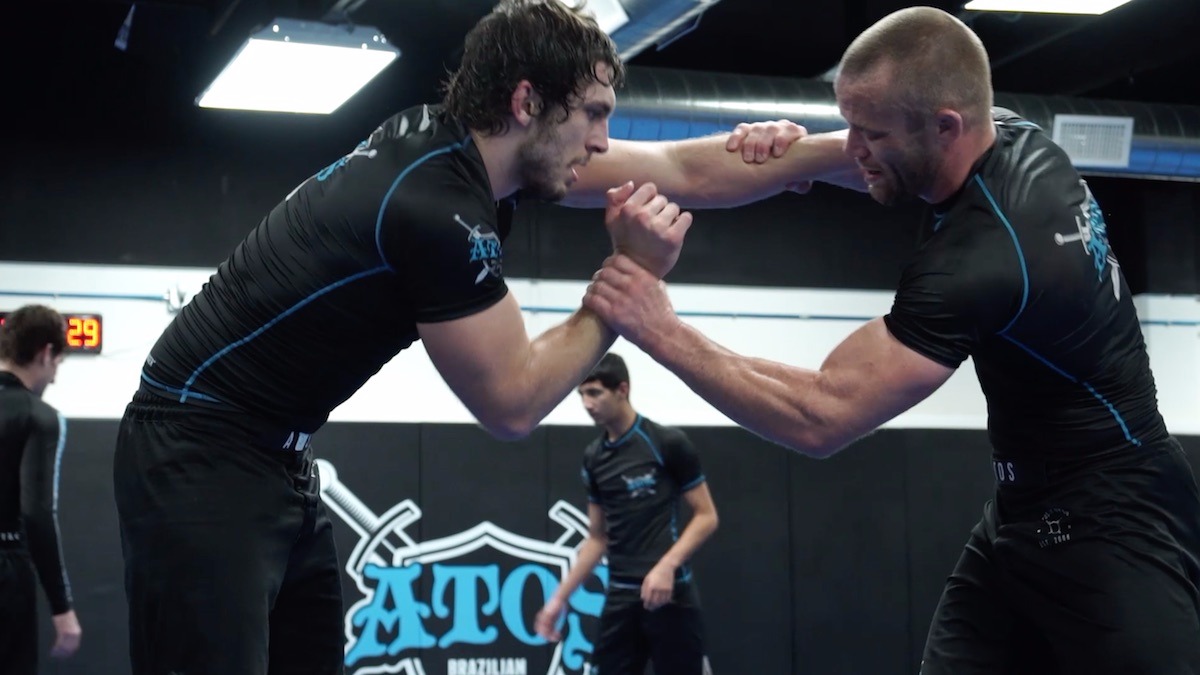
Hinger training at Atos in San Diego with Reid of FloGrappling.
As you can see, this can very quickly turn into a yes/no question flowchart. I won't attempt to create a manual here and now, but here are some questions that create each unique situation.
Does this brown or black belt student teach at your academy? If so, are they paid to teach those classes? Do they cover classes for the professor whenever they are out of town on jiu-jitsu business. Is the athlete sponsored by a company that the professor put them in contact with? If they train at other academies, are they skipping training with their own team? Are they teaching classes at the other academy? Where is the other academy? Across the street, three hours away, or in another state? Is the black or brown belt student married to a student who trains at another academy? If so, how the hell are you going to tell someone they can't train with their spouse? Or their brother? Or their best friend of 20 years?
You see? It's complicated…
Just the other day on Instagram I noticed that jiu-jitsu power couple Yan Lucas (Ribeiro Jiu-Jitsu) and Claudia do Val (De La Riva JJ) belong to separate teams. It's unimaginable to tell them they cannot train together, or with their teammates when visiting.
What really brought this topic to my attention was when I told my good friend that I will be teaching a seminar in their area, and they said, "My instructor will get mad if I go." In my opinion, this is absolutely ridiculous. I convinced them to come regardless and just left them out of the pictures.
I had another friend who told me that their instructor forbade a boyfriend and girlfriend jiu-jitsu couple from training or drilling at their own house. This level of control is inexcusable. When I asked why they would let someone control them like that, they explained that they figured all academies were like this, and they loved jiu-jitsu so they followed the rules so they could train. They didn't know any better because they had never been anywhere else.
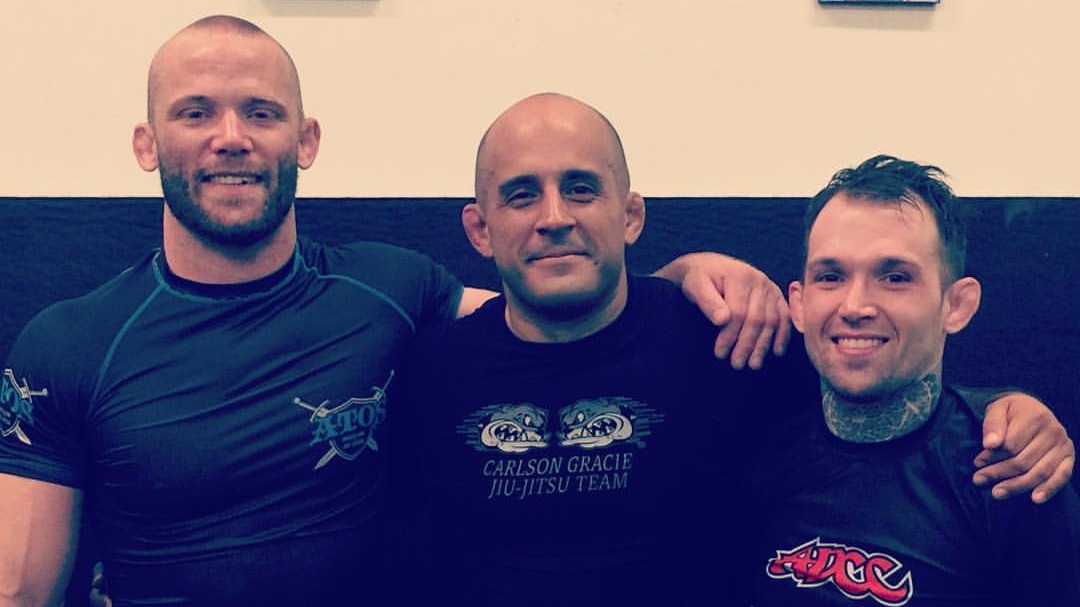
Josh Hinger (left) pictured at Gracie Jiu Jitsu Menifee. Photo: instagram.com/kway00
Other teams might use a visiting black belt as a measuring stick to test their best guys. They might give the visitor a shark tank, or carelessly pull a wristlock too hard and too quickly. Because if a visitor gets hurt, it doesn't hurt their team. I can say from firsthand experience that sometimes this is true: I never let my guard down when visiting an academy.
Jiu-jitsu teams invest in their top athletes. On many occasions, team titles at big tournaments are decided by the podium placing of one or two athletes. And just recently, UAEJJF started giving cash prizes to the top teams at their Grand Slam and World Pro events. For full-time competitive athletes, an injury is the worst possible outcome. Without the ability to compete and teach jiu-jitsu, it is very difficult for full-timers to generate an income.
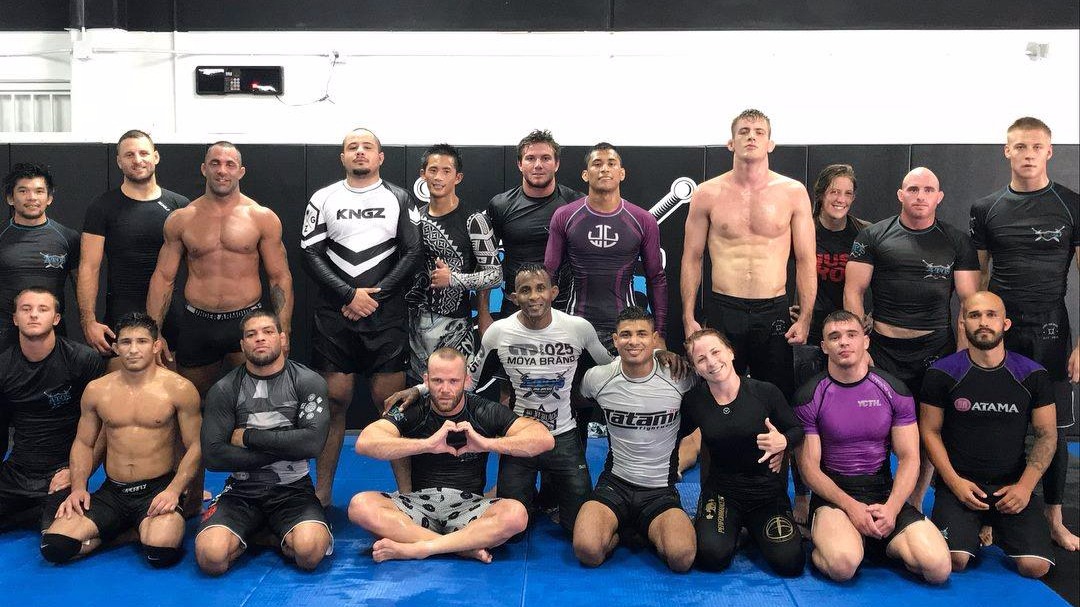
The Atos team pre-ADCC training camp.
If a team leader or coach is preaching "loyalty" to their paying students, I would quickly call bullshit. If they are claiming to want to hide their "training secrets," I call bullshit. Most jiu-jitsu practitioners aren't competitive athletes. Most jiu-jitsu practitioners just want to train jiu-jitsu, stay in shape, have fun, and make new friends.
THIS is the reason why they would want to train with other teams, and THIS is what will bring more people to jiu-jitsu. Team harmony and cross-team friendships will help the growth of jiu-jitsu far more than archaic, closed-bubble, tribal mentalities. Nobody signs up for jiu-jitsu to be part of a gang, and nobody wants to shun others because they belong to another team. Those days are long gone, and the old-school mentalities are slowly dying with the older generation.
Most importantly, don't forget… you are a grown-ass adult and you can do whatever the heck you want.
Josh Hinger is an IBJJF 2016 black belt no-gi world champion representing Atos Jiu-Jitsu. Follow him on Instagram and Facebook.
If a student was to train at another team without explicit permission from his or her instructor, then that student would be met with harsh criticism, exclusion, and sometimes even expulsion from his or her team.
The mentality of exclusively training in one gym was more common in the earlier years of jiu-jitsu expansion, especially the 1990s and early 2000s. As jiu-jitsu continues to grow around the world it is becoming more common to see practitioners embracing the mindset of "jiu-jitsu vs. the world" -- or that of the "extended jiu-jitsu family," which is to accept all jiu-jitsu practitioners as your brethren.

The Atos team in San Diego, as led by Andre Galvao.
It is apparent, based on recent social media activity, that the jury is still out on whether training at different teams is considered acceptable behavior or not. Of course, every situation is unique and no single rule can fairly cover all potential situations that will arise.
Here, I will unpack and dissect some of the more nuanced situations about cross-team training. There is still some debate about the treatment of part-time hobbyist practitioners versus full-timers, what to do during high-profile training camps, training while traveling, and managing friendships and relationships between members of different teams.
Also, for the sake of debate, it is important to understand why team leaders may not want their students and athletes training with other teams.
The average student
I assume that the average student is one who pays their monthly membership dues, trains around work commitments, and participates in local competitions when his or her schedule permits.It is my strong opinion that these types of students can train wherever they want, whenever they want. They are not bound by the "loyalty" argument. Customer loyalty is generally built when they are satisfied with the service for which they are paying. They pay their dues for the services of the instructor, and that's that. I don't believe the instructor has any right to ask (or demand) that the student does not train anywhere else.

Josh working with some of his students at Atos. Photo: Heather Raftery
Now if the instructor, or academy owner, is allowing a student to train at their academy for free, I can certainly understand why they might become frustrated with the idea of their scholarship student training with other teams. But still, I believe that the instructor doesn't not have a legitimate claim to tell the student not to train elsewhere. However, I do feel that if they are frustrated with the situation, they have every right to charge that student for training just like every other normal student. This leads to the topic, which is a bit more complicated -- the full-time competitor.
Full-time black and brown belt competitors
This can be a complex situation in which broad rules don't always apply. First of all, black and brown belts often have a more independent identity than white, blue, and purple belts. They've been in the jiu-jitsu game for at least 8-10 years. They likely have a very well-developed network of jiu-jitsu friends across a variety of teams, and they probably will have a more difficult time accepting a rule that tells them that they cannot train somewhere else, given that they have probably already trained at more than one academy throughout their jiu-jitsu career.Now if this is a homegrown black or brown belt, meaning that they have been with the same instructor since their first day of jiu-jitsu, then I would ask if they are still paying membership dues. If yes, then as I mentioned before they can do whatever the hell they want. If no, then they need to have a conversation.

Hinger training at Atos in San Diego with Reid of FloGrappling.
As you can see, this can very quickly turn into a yes/no question flowchart. I won't attempt to create a manual here and now, but here are some questions that create each unique situation.
Does this brown or black belt student teach at your academy? If so, are they paid to teach those classes? Do they cover classes for the professor whenever they are out of town on jiu-jitsu business. Is the athlete sponsored by a company that the professor put them in contact with? If they train at other academies, are they skipping training with their own team? Are they teaching classes at the other academy? Where is the other academy? Across the street, three hours away, or in another state? Is the black or brown belt student married to a student who trains at another academy? If so, how the hell are you going to tell someone they can't train with their spouse? Or their brother? Or their best friend of 20 years?
You see? It's complicated…
Just the other day on Instagram I noticed that jiu-jitsu power couple Yan Lucas (Ribeiro Jiu-Jitsu) and Claudia do Val (De La Riva JJ) belong to separate teams. It's unimaginable to tell them they cannot train together, or with their teammates when visiting.
What really brought this topic to my attention was when I told my good friend that I will be teaching a seminar in their area, and they said, "My instructor will get mad if I go." In my opinion, this is absolutely ridiculous. I convinced them to come regardless and just left them out of the pictures.
I had another friend who told me that their instructor forbade a boyfriend and girlfriend jiu-jitsu couple from training or drilling at their own house. This level of control is inexcusable. When I asked why they would let someone control them like that, they explained that they figured all academies were like this, and they loved jiu-jitsu so they followed the rules so they could train. They didn't know any better because they had never been anywhere else.

Josh Hinger (left) pictured at Gracie Jiu Jitsu Menifee. Photo: instagram.com/kway00
Why ask students not to train with other teams?
The most legitimate concern I have ever heard on this topic was from my own professor, Andre Galvao. He said, "Be careful, they might try to hurt you." He didn't mean they would intentionally hurt me in a malicious way but more in the context that they are going to train competition-level hard, and they might carelessly hurt me while training.Other teams might use a visiting black belt as a measuring stick to test their best guys. They might give the visitor a shark tank, or carelessly pull a wristlock too hard and too quickly. Because if a visitor gets hurt, it doesn't hurt their team. I can say from firsthand experience that sometimes this is true: I never let my guard down when visiting an academy.
Jiu-jitsu teams invest in their top athletes. On many occasions, team titles at big tournaments are decided by the podium placing of one or two athletes. And just recently, UAEJJF started giving cash prizes to the top teams at their Grand Slam and World Pro events. For full-time competitive athletes, an injury is the worst possible outcome. Without the ability to compete and teach jiu-jitsu, it is very difficult for full-timers to generate an income.

The Atos team pre-ADCC training camp.
If a team leader or coach is preaching "loyalty" to their paying students, I would quickly call bullshit. If they are claiming to want to hide their "training secrets," I call bullshit. Most jiu-jitsu practitioners aren't competitive athletes. Most jiu-jitsu practitioners just want to train jiu-jitsu, stay in shape, have fun, and make new friends.
THIS is the reason why they would want to train with other teams, and THIS is what will bring more people to jiu-jitsu. Team harmony and cross-team friendships will help the growth of jiu-jitsu far more than archaic, closed-bubble, tribal mentalities. Nobody signs up for jiu-jitsu to be part of a gang, and nobody wants to shun others because they belong to another team. Those days are long gone, and the old-school mentalities are slowly dying with the older generation.
Most importantly, don't forget… you are a grown-ass adult and you can do whatever the heck you want.
Josh Hinger is an IBJJF 2016 black belt no-gi world champion representing Atos Jiu-Jitsu. Follow him on Instagram and Facebook.